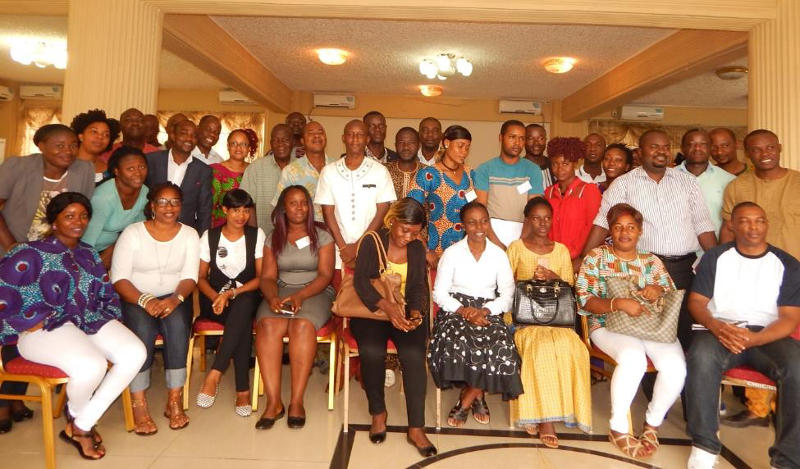MONROVIA, Montserrado – More than 45 Human Resource personnel in Liberia met for a one-day capacity development session organized by the Association of Liberian Human Resource Professionals on Saturday, at the Corina Hotel in Monrovia.
Critical areas covered included organizational development, leading a highly performing team and the Liberian labor law.
ALHRP president, Jonah Soe Kotee, said the event was aimed at developing the capacity of HR professionals from both public and private organizations across the country.
“It will reduce the labor cases at the Ministry of Labor when [human resource professionals] understand the requirements for [the Decent Work Act]. So, it means, cases going to the Ministry are definitely going to reduce.
“Organizational-wise, in relation to where they work, it’s going to build their own capacities to lead organizational changes and growth at their various work places,†he said.
Kotee also pointed out the rising issue of wrongful dismissals being reported because most HR professionals do not fully understand the new labor law.
He said that Saturday’s session was meant to set the pace for HR professionals to understand some critical issues under the law.
“Even though we didn’t exhaust the entire Decent Work Act, but subsequently, we are going to be dealing with topics in series until we can complete the chapters of the Act before the end of the year,†he added.
The initiative, according to him, is the association’s contribution in supporting the Ministry of Labor in bringing businesses and organizations to understand the Decent Work Act.

Jonah Soe Kotee, President of Association of Liberia Human Resource Professionals; Photo: Gbatemah Senah
He also pointed out that human resource as a discipline is new to Liberia, calling on those having undergraduate and graduate degrees in business administration and the liberal arts to come on board for training to build capacities that can lead change and institute the new discipline across the country.
Despite the new law guiding the labor sector, low education and awareness from employees and employers seem to challenge the full implementation of the law.
In May last year, the legislature passed the Decent Work Act, which sets wages for all workers in the formal sector – also known as skilled workers – at US$5.50 per day, or US$0.68 per hour. Wages for unskilled workers, including domestic and casual workers, were set at US$3.50 per day or US$0.43 per hour.
The new law, among other things, requires that a Minimum Wage Board be established after two years to study and propose increases in the minimum wage depending on the existing economic conditions.
The Ministry of Labor says employers, as required by law, are responsible for publishing a summary of key rules in addition to personnel manuals at their respective places of work. Employers who violate these rules are liable to fines by labor inspectors.
A visit to key businesses around Paynesville has, however, shown that little effort is being made to educate employers and employees on the new labor regulations.
Baahju Collins, a labor lawyer at the Labour Ministry, disclosed that although the ministry is yet to cover the country’s entire labor force, it is making frantic decisions to educate the labor force and related organizations on the new labor law.
Collins commented on Saturday’s event, saying it is one of several events that the ministry has used to provide education and clarifications to stakeholders in the labor sector on labor regulations.
“Over time there has been education provided on the law. It’s just that we are still in the process and have not been able to exhaust the entire labor economy yet, but we are educating the population,†he said.
He added that in addition to organized forums, employees and employers relate to the ministry when they have confusion and need readdress on certain provisions in the law. According to him, the ministry is also working on a program to provide regular education on the labor laws in work places, schools, and on public media soon.
Critical issues raised by participants at the training include proper explanation on the daily working hours and lunch break, as provided in the Decent Work Act, and calculation of redundancy benefits among others.
Meanwhile, Collins clarified that the required eight-hour work day includes a one-hour lunch break. He further explained that redundancy is permissible under the law for economic crisis and organizational restructuring purposes.
However, Collins said that the law also provides for a severance benefit of a one-month salary for each completed year an employee has worked if affected by redundancy.
“To dismiss an employee under the new law, the employer must have justifiable reason for such dismissal. Once that dismissal is justifiable, obviously, that person is not entitled to severance,†Collins disclosed.
He also disclosed that an employee who proves wrongfully dismissal as per the law requirement, would be awarded 24-months of his last six-months salary and other benefits.
Vivian Samuels, human resource consultant at MNG Gold Liberia described the one-day engagement as rewarding.
Samuels said it is important for HR personnel to seek understanding on critical issues they may face at their assigned institutions, noting that whenever HR personnel fall short, it becomes a burden to his or her institution of work.
Featured photo by Gbatemah Senah




